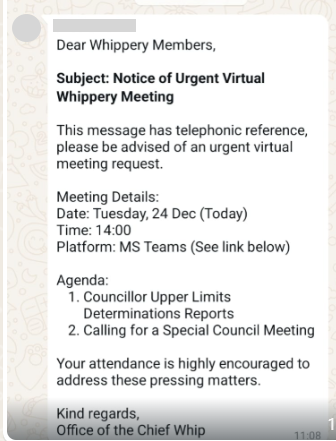The dedication of the whips in the Tshwane city council seemingly knows no bounds, to the extent that they held a meeting on 24 December – a day before Christmas and during the council recess.
On the agenda? Preparation for a council meeting to approve their own salary increases!
Image: Supplied
Their enthusiasm was evidently contagious, because the entire council will meet on 14 January for a special council meeting about the same matter – even though the January council meeting is scheduled to take place during the last week of the month, as it does every month.
By going the extra mile for the city, the councillors will take the ‘worry’ out of their ‘Janu-worry’.
They are expected to be rewarded when the 5% increase proposed for the current financial year is paid at the end of the month – backdated to 1 July 2024.
In addition, each will get an increase in their monthly cellphone allowance of R1 486 if the proposal is accepted.
To be fair, in the previous financial year they, like the administration, got no increase because the cupboard was bare.
Tshwane’s finances are still under severe pressure with Eskom listing the institution as its fourth biggest debtor, having been R6.7 billion in arrears at the end of November.
According to a report that will be served at the council meeting, the minister of cooperative governance and traditional affairs (Cogta), in consultation with the members of the executive council (MECs) in each province, from time to time determines the upper limits of salaries and allowances of councillors.
ALSO READ: Tshwane’s new deputy mayor, and former finance MMC, told to settle his R620k municipal debt [VIDEO]
Upper limits and process
Councillors are also entitled to membership of a medical scheme and pension fund, and the upper limits of the employer’s contributions in this regard are also determined by the minister after the relevant consultations. Councillors may structure their salaries to provide for motor and housing allowances.
The council must then decide on the salaries and allowances, as long as they don’t exceed the upper limits, and consult the MEC.
The council did take a decision at the end of October, soon after Minister of Cooperative Governance and Traditional Affairs Velenkosini Hlabisa published the latest set of upper limits in the Government Gazette.
The Gauteng MEC for cooperative governance and traditional affairs, Jacob Mamabolo, however referred the decision back due to a technicality.
Council members are now expected to rescind their October decision and take a new one on their increases for the current financial year.
The upper limits published in October:
Source: Government Gazette 51419
ALSO READ: ‘Broke’ ex-mayor could be forced to pay back salary to City of Tshwane
Tshwane is a Grade 6 municipality and councillors serving in any of the positions mentioned in the table above are full-time.
Regular councillors in Tshwane, who do not serve in any of these positions, are part-time.
The upper limits that apply to part-time councillors are shown separately:
These amounts are for total remuneration, which is defined as follows:
Source: Government Gazette 51419
The minister set the upper limit for cellphone allowances at R3 600 per month, which is what Tshwane councillors will get if the proposal to council is approved.
The city’s budget for 2024/25 provides for the recommended 5% increase – that is 4.5% from 1 July 2024 and a further 1.5% from 1 March 2025.
In total, the City of Tshwane budgeted R119 million for councillor salaries, R4.8 million for their pension and Unemployment Insurance Fund (UIF) contributions, R4.4 million for contributions to their medical schemes and R32 million for motor allowances.
In total, it is expected to pay out R161 million to compensate its 210 council members for their time and effort.
ALSO READ: ‘It’s below inflation’: DA caucus defends salary increase for Joburg councillors
According to the city’s budget, the salaries of its political office bearers will be very close to the upper limits if the proposal is accepted:
This article was republished from Moneyweb. Read the original here.
